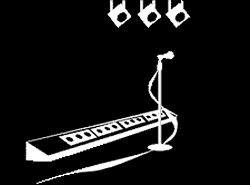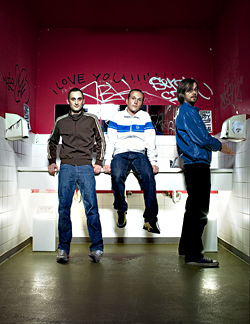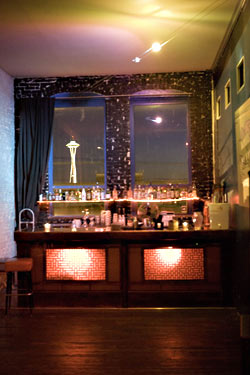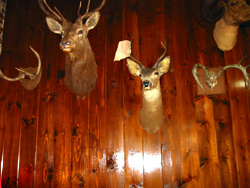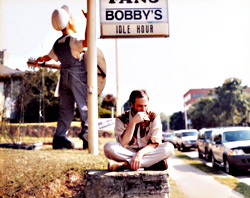Dressed in a funereal three-piece black suit, Blixa Bargeld, vocalist and founder of industrial band Einstürzende Neubauten, cut a dapper figure in the spotlight of an otherwise empty Triple Door stage Friday, Feb. 3. Bargeld greeted the enthusiastic audience with absurdist good humor, like Moe of the Three Stooges lecturing at Bauhaus. (“Gute nacht!” yelled my Deutschophile companion, rapping her fist on the table.) Bargeld’s instruments did not arrive, he says, gesturing at the bare stage. “I only have the four foot pedals which were magically in my carry-on luggage.” His performance would be solely vocal, and why not—the man, after all, contains a complete sound-effects library down his gullet. The pedals helped, too, allowing him to layer his vocals in odd, imaginative ways. Swaying back and forth, he entered into a quirky spiritual, making it sound like a group of Benedictine monks who’ve discovered the Ibanez Tube Screamer.
Bargeld was the headliner of the How to Destroy the Universe Festival, now in its fifth year, which gathers filmmakers and avant-garde and industrial performers, including the Living Jarboe (ex-Swans), Burning Man prop-punks F-SPACE, and synth duo the Sixteens (a different show of theirs was reviewed in last week’s issue). But instead of destroying the universe, Bargeld created one. At one point, during the 30-second time window one of the recording pedals allowed, he named a few planets. “Maybe I should put in some stars,” he added. “Do-do-do-diddle-diddle-do.” Soon after, he let loose the Munchian scream for which he’s infamous, looping and then shortening it to a staccato, yapping Chihuahua-like noise. Bargeld urged the audience to play along: “Don’t worry—whatever note you hit, it’s always going to be ‘D.’ ‘D’ is the de facto note.” On a French count of un, deux, trois, the audience offered up its best Buddhist moo. When he later asked for a term to sound out, someone yelled “Schopenhauer,” which ought to give you an idea of the people at this show.
Like Bargeld, Jarboe doesn’t need elaborate stagecraft to create drama. The performer’s setup was still a little more stripped down than I’d expected from the visceral hoodoo-voodoo of her techno-spooky Anhedoniac, Thirteen Masks, and the recent Men Album (Atavistic), featuring an appearance by Bargeld. A classically trained vocalist and performance artist, Jarboe used the bare stage (with guitarist Nic Le Ban and keyboardist Renee Nelson) to play with illusion, “masking” her voice with dialects and storytelling in ode to her Southern upbringing. Dressed in an earthy tunic and jeans, she could’ve been Sarah McLachlan hiding behind a wall of hair, albeit a McLachlan given to cooing, “My hunger makes you feel me.” Surprisingly, before Men‘s staid numbers, her most accessible work to date, Jarboe reworked Swans’ caustic “You’re Not Real, Girl” and “Song for Dead Time” with the detached tenderness of Billie Holiday. Her vocal switcheroo was enough to realign the planets.
